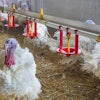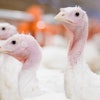Commercial derivatives of specific strains of Saccharomyces cervisiae have the ability to agglutinate salmonella expressing Type-1 fimbriae within the intestinal tract of chickens. Laboratory evaluation of the four available licensed Salmonella Typhimurium mutant vaccines for poultry was performed by Dr. Kyle Newman of Venture Laboratories in Lexington, Ky., to determine the possible effect of yeast cell-wall derivatives on vaccine organisms. Vaccines were supplied by the three manufacturers of the four USDA-approved live mutant products.
Applying the in vitro analytical method described by Mirelman developed in 1980, none of the four vaccines were affected by either Bio-Mos or Actigen which are prebiotics extracted and purified from the cell wall of a specific yeast strain. The test demonstrated that the two prebiotic products which have beneficial properties are compatible with administration and subsequent viability of the four USDA-licensed Salmonella Typhimurium mutant vaccines administered to protect the intestinal tract against colonization with Salmonella enteriditis and other salmonella serotypes.

















